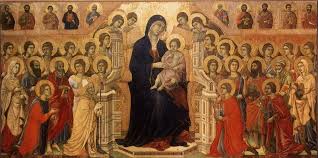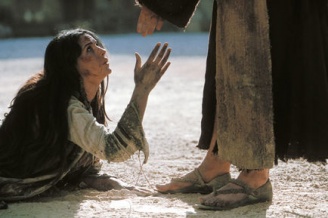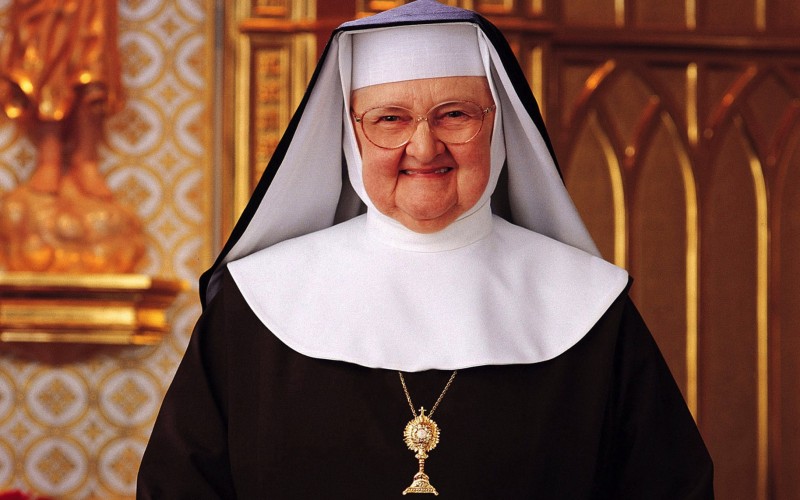Does Praying to Saints Equal Worshipping the Saints?

For many of our Protestant friends, the idea of “praying to saints” is tantamount to adoring them as God. In his book, Answers to Catholic Claims – A Discussion of Biblical Authority, James White writes:
Prayer, it is asserted [in Scripture], is an act of worship, and we are to worship God alone.”
If this is true then Catholics are committing the sin of idolatry every time they pray to a saint. But is this true?
The Catholic Response
When Catholics say they are “praying” to God and “praying” to saints they are talking about qualitatively different things as different as a monkey is from a man. The Protestant generally only has one species in mind when he thinks of prayer—prayer to God that necessarily includes adoration. But one need only pick up a dictionary to discover there are in truth different definitions and therefore different usages of the same word, “prayer,” in English.
Prayer:
The act or practice of praying.
1.An earnest request; entreaty; supplication
2.(a) humble entreaty addressed to God, to a god, etc.: (b) a request made to God, etc.; as, her prayer for his safe return; (c) any set formula for praying, as to God.
Prayer is not, by definition, necessarily equal to the adoration that is due God alone. Prayer can certainly involve an act of adoration when it is directed to God, but the term does not necessarily denote adoration. It can simply mean “a request.”
In Old English we did not have so much of a difficulty here. One could say to another, “Pray tell…” or, “I pray thee my lord…” without raising an eyebrow. In fact, the King James Bible gives us many examples of the term “prayer” being used analogous to the way Catholics use it when we “pray” to saints. With a touch of Old English, when Bathsheba makes a request of King Solomon in I Kings 2:20, the KJV has her say: “I pray thee, say me not nay.” There was never a question here of whether the King James Bible was presenting Bathsheba as adoring her son as God, or praying to him in a way that is forbidden. It was not. Nor are Catholics when they pray to saints. Catholics certainly honor the saints when they pray to them. In other words, they do not talk to them like they would talk to the boys at the local bar and grill. They show great respect and reverence for them. But they do not adore them as they adore God alone. And they also petition them for their prayers because Scripture makes very clear that Christians need each other as members of the body of Christ (see I Cor. 12:12-27).
Defining the Difference
The Catholic Church has gone to great lengths to define the essential difference between prayer to God and prayer to saints. You may have noticed that I have been using the English word “adoration” to refer to that honor Catholics give to God alone. I do so because in Catholic tradition when using the English language, “worship” has often been used of honor given to the saints. “Adoration” is the term that has come to be used for God alone. “Worship” and “adoration” are English translations of terms the Church uses in her definitive teaching to define the difference between the honor that is given God and the honor proffered to the saints.
The Second Ecumenical Council of Nicaea, in AD 787, referred to this “adoration” given to God alone as latreia (Greek) or latria (Latin). This comes from a Greek root that we find in Scripture in multiple places and in different words. In Gal. 5:20, for example, we find St. Paul condemning “idolatry”— Gr.-idolatreia. This term literally means “idol-adoration” (or, popularly, “idol-worship”). Another example is found in Hebrews 9:6 where the inspired author refers to the ministry of priests in the Old Testament as offering their “ritual duties” to God (Gr.—latreias).
The Council Fathers used latria in this sense of “adoration” that ought only to be given to God. When the Council considered praying to saints, they taught that this prayer should include the honor that is owed them in justice, but never adoration. They chose to use douleia (Greek) or dulia (Latin) in order to make this distinction clear. Hence, we have an entirely different kind of prayer offered to the saints than to God. In the Council’s Doctrinal Definition, the fathers declared:
The more frequently they are seen in representational art, the more are those who see them drawn to remember and long for those who serve as models, and to pay these images the tribute of salutation and respectful veneration. Certainly this is not the full adoration {latria} in accordance with our faith, which is properly paid only to the divine nature, but it resembles that given to the figure of the honored and life-giving cross, and also to the holy books of the gospels and to other sacred cult objects. Further, people are drawn to honor these images with the offering of incense and lights, as was piously established by ancient custom. Indeed, the honor paid to an image traverses it, reaching the model, and he who venerates the image, venerates the person represented in that image.
Biblical Examples
The Bible teaches us we should honor great members of the Body of Christ for three essential reasons. First, out of respect for their office or position. One example of such honor is found in I Thess. 5:12-13:
But we beseech you, brethren, to respect those who labor among you and are over you in the Lord and admonish you, and to esteem them very highly in love because of their work.
Secondly, Christians are called to honor other members of the Body of Christ for what God has done through them, or more precisely, for their cooperation with God’s grace in allowing him to work through them. St. Paul tells us as much in I Tim. 5:17. Notice, he exhorts us to give “double honor” to those elders in the Church who “rule well” the household of faith:
Let the elders who rule well be considered worthy of double honor, especially those who labor in preaching and teaching.
And we should note at this point that there is no reason to believe this honor somehow ceases at death. Revelation 5:8 reveals that we have “elders” in heaven who continue their ministry to other members of the body of Christ who would be owed honor as well.
The third reason Christians honor men and women of faith is perhaps the most important—for their holiness. True greatness in the body of Christ comes through obedience to the word of God. In Matt. 5:19-20, Jesus himself speaks of “greater” and “lesser” members of the kingdom rooted in their level of obedience to God’s commandments:
Whoever then relaxes one of the least of these commandments and teaches men so shall be called least in the kingdom of heaven; but he who does them and teaches them shall be called great in the kingdom of heaven. For I tell you, unless your righteousness exceeds that of the scribes and Pharisees, you will never enter the kingdom of heaven.
This is a foundational principle as to why we honor the saints in heaven more so than we honor members of the body of Christ on earth. The saints in heaven are free from all sin and are truly the greatest in the kingdom; therefore, they deserve the greatest of honor.
Catholic belief that those who are truly great in the kingdom of God should be honored as such fits very well with the famous and prophetic words from our Lady herself, who prophesied in Luke 1:46-49:
And Mary said, “My soul magnifies the Lord, and my spirit rejoices in God my Savior, for he has regarded the low estate of his handmaiden. For behold, henceforth all generations will call me blessed; for he who is mighty has done great things for me, and holy is his name.”
According to Revelation 21:10-14, we see God himself honors the twelve apostles by inscribing their names in the foundation of the eternal city in heaven:
And in the Spirit he carried me away to a great, high mountain, and showed me the holy city Jerusalem coming down out of heaven from God, having the glory of God, its radiance like a most rare jewel, like a jasper, clear as crystal. It had a great, high wall, with twelve gates, and at the gates twelve angels, and on the gates the names of the twelve tribes of the sons of Israel were inscribed; on the east three gates, on the north three gates, on the south three gates, and on the west three gates. And the wall of the city had twelve foundations, and on them the twelve names of the twelve apostles of the Lamb.
These texts and others we could examine are profound examples of the old axiom: grace builds upon nature. Indeed, it is deep within the race to want to honor great men and women of courage and accomplishment. One cannot visit a single city in the world that does not proudly exhibit statues and plaques honoring heroes of old. Not only is there nothing in Scripture to suggest Christians should somehow suppress this good and natural impulse, but the texts we have seen above suggest this ought to be done in a Christian context as well.
The Example Among Examples
In Gen. 33:3, Jacob “bows himself to the ground seven times” before his elder brother Esau as a sign of respect toward his elder brother. In I Kings 1:16, Bathsheba “bowed and did obeisance” before her King and husband, David, venerating the office of the king of Israel. In I Kings 2:19, King Solomon “bows to” his mother, Bathsheba, venerating the office of Queen Mother, the second highest authority in the Kingdom of David.
In the New Testament, Jesus is so insistent upon the proper honor being given among his people that he has some stern words for those who fail to get it right in this life:
Behold, I will make those of the synagogue of Satan who say that they are Jews and are not, but lie–behold, I will make them come and bow down before your feet, and learn that I have loved you.
But perhaps the greatest biblical example of the veneration of the saints comes from Psalm 45 where the first 9 verses are well-known as Messianic in nature, prophesying in some detail concerning Christ the King:
My heart overflows with a goodly theme; I address my verses to the king… In your majesty ride forth victoriously for the cause of truth and to defend the right… Your divine throne endures forever and ever. Your royal scepter is a scepter of equity; you love righteousness and hate wickedness. Therefore God, your God, has anointed you with the oil of gladness above your fellows; your robes are all fragrant… From ivory palaces stringed instruments make you glad; daughters of kings are among your ladies of honor.
There is no question concerning the prophetic nature and value of this passage when we consider the inspired author of Hebrews, in Hebrews 1:8-9, quoted verses 6-7 as referring to Christ, his divinity, and his kingship. Yet, there is more to this ancient Psalm about which not as many people are aware. When we examine the rest of Psalm 45:9-17, immediately following the above text, there is another prophecy that speaks of Mary:
At your right hand stands the queen in gold of Ophir. Hear, O daughter, consider, and incline your ear; forget your people and your father’s house; and the king will desire your beauty. Since he is your lord, bow to him; the people of Tyre will sue your favor with gifts, the richest of the people with all kinds of wealth. The princess is decked in her chamber with gold-woven robes; in many-colored robes she is led to the king, with her virgin companions, her escort, in her train. With joy and gladness they are led along as they enter the palace of the king. Instead of your fathers shall be your sons; you will make them princes in all the earth. I will cause your name to be celebrated in all generations; therefore the peoples will praise you forever and ever.
Set in the context of a royal wedding, on the literal level, this Psalm referred to the King of Israel, probably Solomon, receiving a new bride. But on the spiritual level it refers to Christ the King in relation to the Church and Mary as spouse of the Holy Spirit. Verses 16-17 in particular speak in terms that can quite easily be seen as fulfilled in the life of the Virgin Mary, the mother of Christ the King, and spouse of the Holy Spirit:
Instead of your fathers shall be your sons; you will make them princes in all the earth. I will cause your name to be celebrated in all generations; therefore the peoples will praise you forever and ever.
Not one of Solomon’s wives fits the description of being remembered in every generation. And while his mother, Bathsheba, may be remembered by many, she is hardly praised in every generation nor would she be able to fulfill a prophecy that appears to go beyond being a Queen of a small state in the Middle East. This Queen and Mother is depicted as “making… princes in all the earth.” Old Covenant Israel never covered the globe. The New Israel, the Church, certainly does. Who better fits the fulfillment of this prophecy than Mary? Every Christian—indeed most of the world beyond Christendom—knows the name of the Mother of God, Mary.
We should also consider that Psalm 45:17 may well be the text of Scripture we hear echoed in the words of Mary herself in Luke 1:48-49. The parallel is worth noting:
Psalm 45:17: “I will cause your name to be celebrated in all generations; therefore the peoples will praise you forever and ever.”
Luke 1:48: “For behold, henceforth all generations shall call me blessed; for he who is mighty has done great things for me, and holy is his name.”
At any rate, this great prophecy of our Lady says that all generations would “praise her?” When was the last time you heard of a Baptist singing praises to Mary and celebrating the fact that she, as Queen Mother, should be honored for giving birth to all of the brothers of Jesus (that’s us Christians) who truly are “princes throughout the earth?”
Then the dragon was angry with the woman, and went off to make war on the rest of her offspring, on those who keep the commandments of God and bear testimony to Jesus.
That is both Catholic and biblical stuff! If you are interested in this topic, you can get a whole lot more by clicking here.






